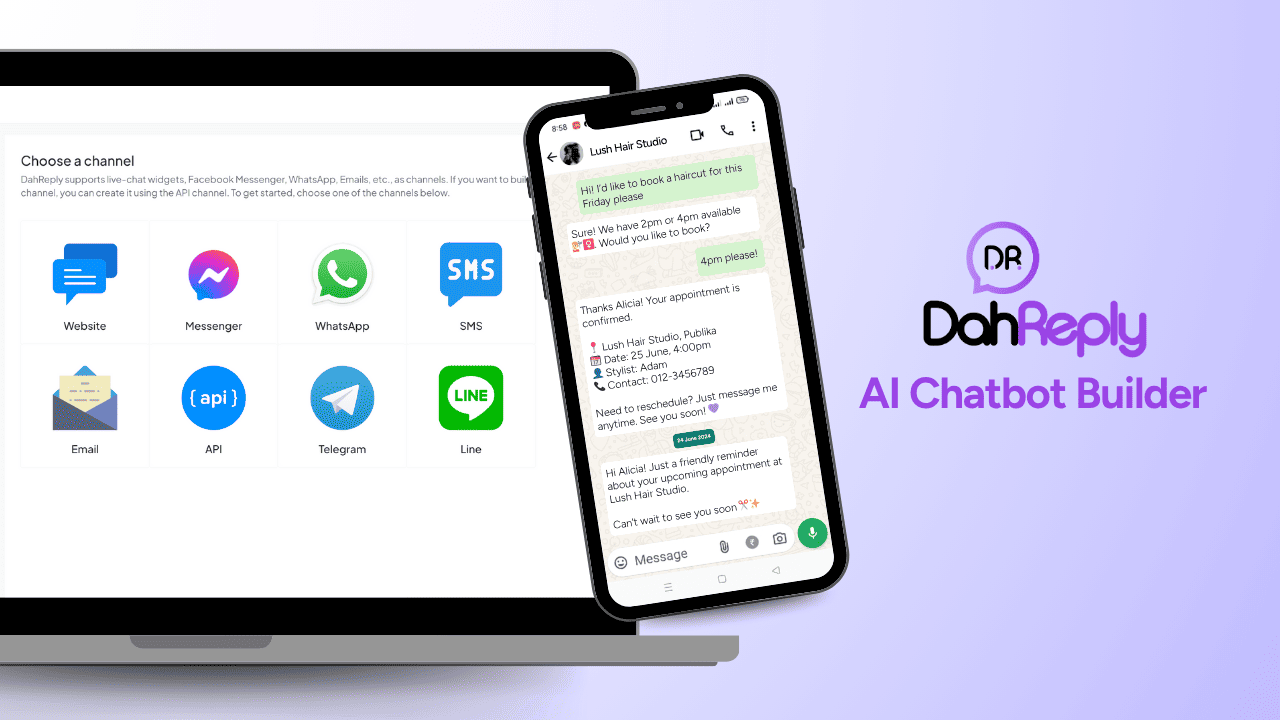TABLE OF CONTENTS
28 October 2025
Recently, Meta announced that WhatsApp will start restricting certain types of AI chatbots — including ChatGPT-style assistants — from operating on its platform. The news caused quite a stir among business owners and developers who rely on WhatsApp to communicate with customers.
But here’s the good news: this change doesn’t affect your business chatbot.
If you’re using DahReply’s WhatsApp automation to handle customer inquiries, manage leads, or streamline support, you can relax — your chatbot will continue working as usual. Let’s break down what’s really happening, why it matters, and how your business can stay ahead.
What Exactly Did WhatsApp Ban?
Starting 15 January 2026, WhatsApp will ban “general-purpose” AI assistants from its platform. ChatGPT, Gemini, Claude, and Perplexity — the kind that let users ask anything and get open-ended responses.
Under Meta’s new rules:
- You can’t build a chatbot on WhatsApp that acts like ChatGPT or any general Q&A assistant.
- You can’t use WhatsApp conversations to train or fine-tune another AI model.
Meta’s reasoning is simple: they want to prevent third-party developers from turning WhatsApp into an AI playground and to protect user data from being repurposed for training large language models (LLMs).

What’s Still Allowed on WhatsApp
Here’s where most people get it wrong — WhatsApp isn’t banning business chatbots. In fact, WhatsApp still supports AI-powered chatbots designed for:
- Customer service and support
- Lead capture and qualification
- Bookings and order management
- E-commerce automation
Businesses can continue using AI (including LLMs) to:
- Detect customer intent
- Generate human-like responses
- Personalise interactions
- Speed up reply times
In other words, if your chatbot helps you serve customers, WhatsApp is perfectly fine with it.
What’s not allowed is using WhatsApp to build another “ChatGPT-style” experience or collecting user messages to train external AI systems.
Why DahReply’s Chatbots Are Unaffected
At DahReply, our AI chatbots have always been built for business workflows, not general conversation.
Our solutions — such as Dah Reply AI Chatbot Builder — are purpose-built for automation, customer engagement, and productivity.
We don’t collect WhatsApp data for model training. We don’t build open-ended assistants. And we always use the official WhatsApp, ensuring every integration is safe, compliant, and sustainable.
That means our clients can continue using WhatsApp to:
- Handle customer inquiries instantly
- Automate repetitive questions
- Guide users through sales and support journeys
- Connect seamlessly to CRMs or internal systems
No disruption. No policy violation. Just smarter, faster conversations.

What This Means for Businesses
This policy update is an important reminder that platform rules can change anytime. Businesses that rely too heavily on one platform — whether WhatsApp, Facebook, or Instagram — risk losing flexibility when policies shift.
That’s why DahReply’s approach has always been channel-agnostic.
Our chatbots work across multiple touchpoints:
- Facebook Messenger
- Web chat widgets
- Internal tools
This ensures your AI strategy is not only compliant but also resilient — ready to adapt if any platform changes its terms.
##The Bigger Picture: Smarter, Responsible AI
Meta’s decision highlights a growing global trend: encouraging responsible and transparent AI use.
Instead of uncontrolled, open-ended AI assistants collecting data from millions of users, the industry is moving toward purpose-built, privacy-aware AI systems — the kind DahReply already builds.
This shift reinforces our belief that the future of AI in business isn’t about creating a “super assistant.” It’s about designing tailored, trustworthy chatbots that genuinely make work easier and customer service smoother.
Future-Proof Your Chatbot Strategy
So, while “WhatsApp bans AI” makes a dramatic headline, the reality is far more reassuring.
If your chatbot:
- Uses LLMs to enhance customer service
- Works through approved WhatsApp Business APIs
- Doesn’t collect or train on user data
— you have nothing to worry about.
At DahReply, we’ll continue helping businesses use AI safely, smartly, and effectively — no matter how the rules evolve.
Need help ensuring your chatbot complies with WhatsApp’s new policy? Get in touch with our team — we’ll review your setup and help you stay future-ready.


